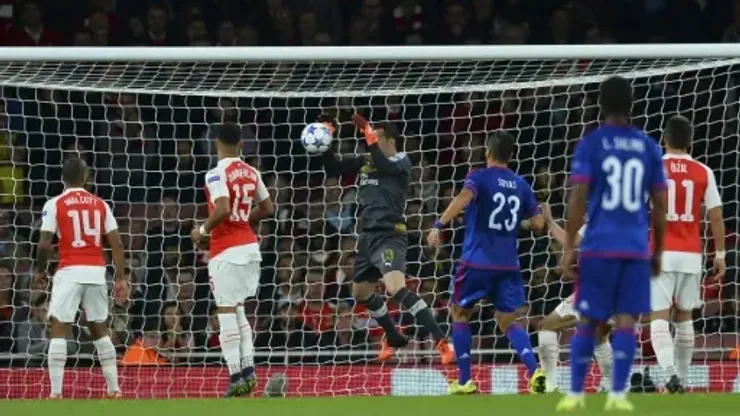Arsenal’s 3-2 setback against Olympiacos at the Emirates on Tuesday set off the usual alarm bells among Gunners supporters as well as the annual ‘bash Arsene Wenger’ circus that ensues after the club puts up a result like this. Once again, the calls for Wenger’s sacking from some quarters are premature and shortsighted. But that is nothing new – Arsenal sports a large element of reactionary fans and the British press often likes to throw them red meat.
First, let us start with Arsenal’s position at this point in time – September 30, 2015. The Gunners sit three points out of the Premier League lead and five points clear of the defending champion Chelsea despite losing to them at Stamford Bridge eleven days ago. If Arsenal defeats Manchester United this weekend, they could go joint-top with the Red Devils. Last season, Arsenal experienced its worst Premier League start under Wenger. By contrast, this season they could be topping the table after eight games.
Secondly, Arsenal supporters and the media need to look honestly at European competition and its value at this point in time. As I argued last week on Divers and Cheats, while the romantic value of the world’s most prestigious club competition remains, for English clubs the league is of paramount importance. The domestic competition is more lucrative in England thanks to TV money and a global interest in the Premier League. While the continental clubs that compete with English clubs including Arsenal in the Champions League have to place a premium on achieving European success not only for brand building reasons but also financial ones, English clubs don’t have to worry about that.
Any realistic appraisal of Arsenal’s current situation would yield a view that the Gunners are not going to win the UEFA Champions League this season. Instead, Wenger’s side, much like each of the previous five seasons, will be capped at making the Round of 16 and being eliminated. Consistently finishing second at the Group Stage has taken a toll on the Gunners fortunes in Europe at a time when perhaps they could have made deeper runs in the competition. But today that is not realistic and given the lack of financial incentive and need to be competitive in the Champions League this season, the competition can be treated pragmatically as a place to experiment for Wenger going forward given the losses to Dinamo Zagreb and Olympiacos.
While it undermines the need to prove Premier League quality in the post-colonial world where English defeatism is a constant narrative, perhaps losses in the Champions League liberate a club to focus on truly winnable competitions. Manchester City and Manchester United were both eliminated at the Group Stage of the 2011-2012 UEFA Champions League while Arsenal and Chelsea advanced to the knockout stages. The result was that the two Manchester clubs finished a full 19 points clear of third-placed Arsenal and 25 points ahead of Chelsea, whose difficult run to lifting the Champions League trophy left them finishing sixth in the Premier League.
Thirdly, given what we’ve outlined above, let’s focus on the relative weakness of the Premier League at the top. Chelsea, the defending champions, have dropped points in five of seven matches thus far this season. Manchester City, last year’s runners-up have been forced to field in four successive league games an 18 year-old attacking player (either Kelechi Iheanacho or Patrick Roberts) late in the match. Both Chelsea and Manchester City lack the depth they both boasted the last few years as the impact of UEFA’s Financial Fair Play (FFP) while Manchester United, Spurs and Liverpool don’t quite have the quality in depth needed to realistically contend for the Premier League title.
That leaves Arsenal potentially as the title favorites if you look at things from a realistic perspective. The Gunners have more quality squad depth than any other side in England’s top flight and will only get stronger as the likes Jack Wilshere and Danny Welbeck return from long-term injuries.
But one thing consistently holding Arsenal back is the lack of cutting edge in big matches against the likes of Chelsea and Manchester United. Arsenal often appears a mentally fragile side in the biggest games that English football has to offer. But if that fragility can be overcome, say starting this weekend against Manchester United, it could leave the Gunners in the driver’s seat for a Premier League title.
Criticism of Arsene Wenger reaches a fever pitch regularly by this point in time during the season. But this year could be very different. The Gunners are genuine title contenders and objectively it is difficult to not see the team, if they’re firing on all cylinders, being in the thick of the title race. Considering the Gunners have either started poorly and closed well or started strong and faded badly late over the course of each of the past ten seasons, a sustained title challenge would be progress.
So Gunners fans and the critics of Wenger should indulge in a degree of patient realism given that Arsenal was never going to win the UEFA Champions League anyway, and the team looks poised to challenge for the Premier League title. If the Gunners do fail to mount the promised title challenge, then we certainly can reopen this conversation in May.
200+ Channels With Sports & News
- Starting price: $33/mo. for fubo Latino Package
- Watch Premier League, Women’s World Cup, Euro 2024 & Gold Cup
The New Home of MLS
- Price: $14.99/mo. for MLS Season Pass
- Watch every MLS game including playoffs & Leagues Cup
Many Sports & ESPN Originals
- Price: $10.99/mo. (or get ESPN+, Hulu & Disney+ for $14.99/mo.)
- Features Bundesliga, LaLiga, Championship, & FA Cup
2,000+ soccer games per year
- Price: $5.99/mo
- Features Champions League, Serie A, Europa League & Brasileirāo
175 Premier League Games & PL TV
- Starting price: $5.99/mo. for Peacock Premium
- Watch 175 exclusive EPL games per season






